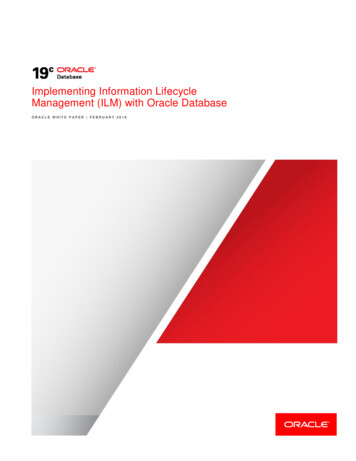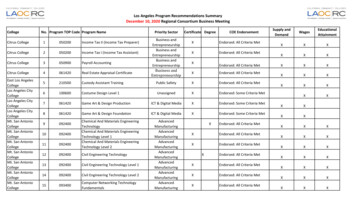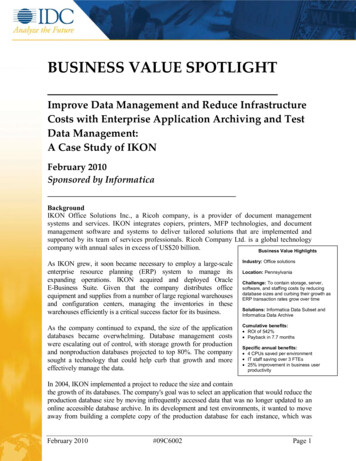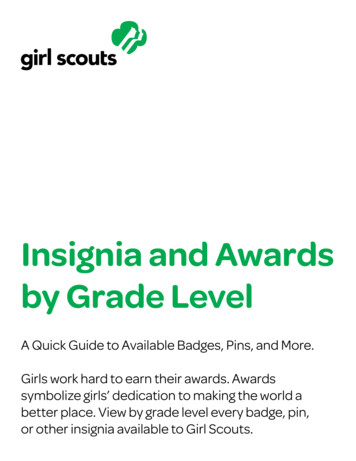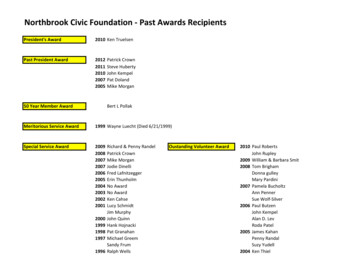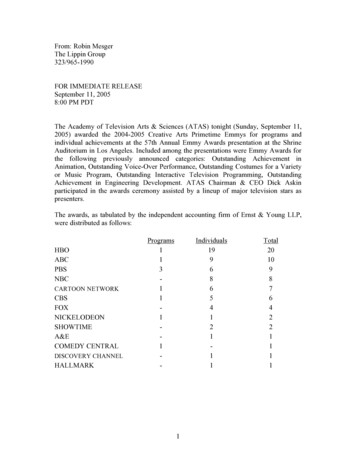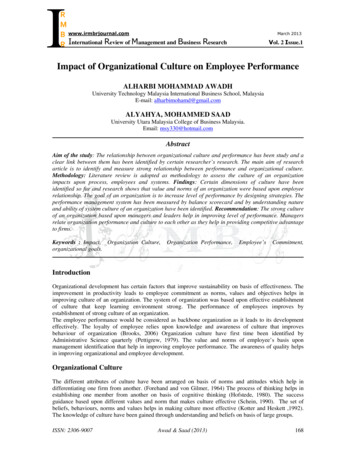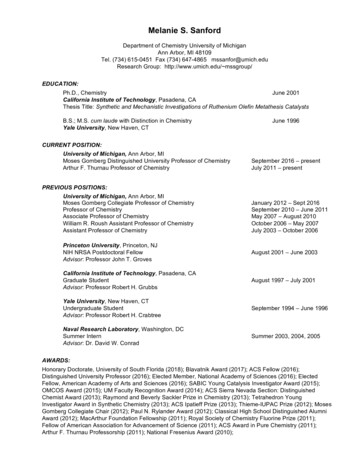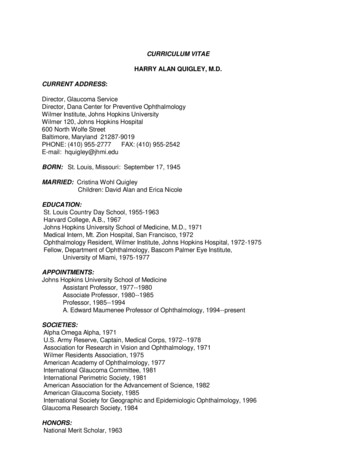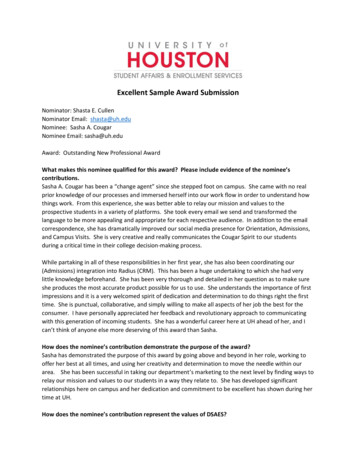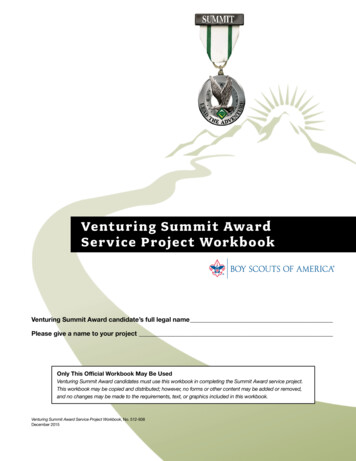
Transcription
ILM Endorsed Award:Improving Performance and Results ThroughLean ManagementCandidate HandbookLast updated 23 July 2021Candidate HandbookPage 1
ILM Endorsed Award in Improving Performance and Results throughLean ManagementContentsWelcome . 3Course Overview . 3Learning outcomes . 3The ILM and this award . 3Award requirements and Assessment . 4Structure, Assignments and submissions . 4Important Dates and Deadlines . 8Assessment Process . 8Celebrating your achievement! . 9Appeal Process . 9Data Security and Confidentiality. 10Registration Procedures . 10Registration Benefits . 10Equal Opportunities Policy at the University of Nottingham . 10Malpractice and Maladministration . 11General process & procedures in the investigation of cases of suspected malpractice . 12Action following an investigation . 13Plagiarism . 14Appendix 1: Suggested time commitment (in hours) . 16Appendix 2: Assessment Criteria and Mark Sheet . 17Candidate HandbookPage 2
ILM Endorsed Award in Improving Performance and Results throughLean ManagementWelcomeWelcome to the ILM Endorsed Award in Improving Performance and Results through LeanManagement. This Candidate Handbook provides the key things that you need to know aboutthe course and the Award. Please make sure that you keep a copy of this handy for referencethroughout the course.Course OverviewThis course is designed for Higher Education staff in all job families who lead improvementinitiatives. It is a practical course of nine sessions supported by a workplace-based improvementinitiative and covers the core tools and techniques of Lean Six Sigma management and thinking.The course is organised around the Lean Six Sigma DMAIC improvement approach and compriseseight taught modules, a Report Out, Individual Learning Journal, Improvement Initiative andProfessional Discussion.A suggested time commitment to complete the course is provided in Appendix 1.Learning outcomesCandidates will: Understand the principles and methodology of Lean Six Sigma to a Green Belt level Develop their individual capability to learn and recognise the opportunities to applysuitable taught tools and techniques Use Lean tools and techniques to improve an identified activity Use the principles of reflection to identify success and opportunities for futureapplications Complete, to a suitable conclusion, an improvement initiative which must be reportedthrough a presentation (Report Out)The ILM and this awardEstablished in November 2002 the ILM is an accreditation body, part of the City & Guilds Groupand is one of the UK’s leading national organisations offering a wide range of qualificationscovering all aspects of leadership and management, HR and enterprise. It has approximately70,000 people registered for an ILM qualification each year, gaining the crucial skills andknowledge to improve their performance at work. Every ILM qualification is practically based, toensure learning is transferred directly to the work environment – to the immediate benefit ofemployers and learners alike.Endorsement of the Improving Performance through Lean Management course by ILM meansthat all aspects of course delivery and assessment have been approved by them. The EndorsedAward in Lean Management is a qualification that has been designed by University ofNottingham Professional Development, University of Nottingham to provide staff withrecognition for their Lean activity work. Therefore, it is a qualification which is unique to theCandidate HandbookPage 3
ILM Endorsed Award in Improving Performance and Results throughLean ManagementUniversity of Nottingham, but it will be recognised by other Universities and employers due tothe ILM endorsement.Award requirements and AssessmentIn order to achieve the Endorsed Award in Lean Management you need to have completed allfour elements below:(a) Registered for the course and paid the fee applicable at the time of advertising thecourse.(b) Attended the sessions of the ILM Improving Performance and Results through LeanManagement course, including the post-module quizzes and assignments: Module 1: Introduction Module 2: Define Module 3: Measure Modules 4 & 5: Analyse Module 6: Improve Module 7: Control Module 8: Improvement Initiative Report Out preparation Report Out Professional Discussion(c) Submitted coursework for assessment and marked as ‘passed’. There is a requirement todemonstrate learning, development and application of skills, tools and techniques by wayof a Report Out, Professional Discussion and completion of an Individual Learning Journal.(d) Delivery of the Improvement Initiative Report Out conducted by the participant (and theirteam if applicable) is mandatory.If you decide not to complete the coursework, you may add attendance of the course to your CVas a Lean Management training course, but you will not have an ILM Endorsed Award unless yousuccessfully complete the assessment.Structure, Assignments and SubmissionsTaught Modules (Module 1-8)Lean Six Sigma concepts are introduced via eight taught modules. Modules 1-7 each consist ofone two-and-a-half hour workshop, a post module quiz to check learning and the application ofCandidate HandbookPage 4
ILM Endorsed Award in Improving Performance and Results throughLean Managementthe learning to the Improvement Initiative via Module Assignments and, for some modules preand/or post activities or learning.Module 8 is a two-hour session providing guidance and preparation support for the Report Out.Module Assignments are used to direct the application of the modules’ learning throughout thecourse to keep the candidates on track and support the progression of their ImprovementInitiative. These module assignments require submission via OneFile but the feedback does notform part of the final overall course assessment. Feedback on the module assignments will beprovided by the course tutors with the outcome for each being either Accept, Resubmission.Module quizzes are not assessed, they are used to guide the candidate (and course tutors) as totheir level of understanding of each module.Improvement InitiativeHow much time you should spend on the coursework and Improvement Initiative will dependprimarily on the complexity of your Improvement Initiative.Your improvement initiative is your Lean project and must: have a named Sponsor who supports the scope of the initiative and who has the authorityto approve your improvements be likely to require Lean tools. Ideally be based on a process that is repeated frequently(daily, weekly or monthly) so that improvements can be made and evidenced in thecourse timescales be realistic to deliver in the course timescales have sufficient scope for meaningful change (the expected benefits outweigh the effort) not currently being worked on by anyone else or there is room for you to lead a subsection of a wider initiative) Ideally, be part of the candidate’s day-job or an area of interestThe Improvement Initiative needs to be confirmed between Module 2 and Module 3 ascandidates should start work on their Improvement Initiative following Module 2’s taughtsession. It must be substantially completed prior to the Report Out and the ProfessionalDiscussion (approx. six months).As part of the application process to the course you will be asked to outline your proposedinitiative topic. A course tutor will evaluate its likely suitability with you.Improvement Initiative Report OutThe highlight of the course is the Report Out, during which Candidates present theirimprovement initiative to their Sponsor, own team/area impacted by the initiative, courseCandidate HandbookPage 5
ILM Endorsed Award in Improving Performance and Results throughLean Managementleader(s) and fellow candidates. Candidates are responsible for scheduling the Report Out whichmust be delivered before the Professional Discussion.The Report Out must answer the following questions:Why did you look at this topic? What was the problem? What was the situation at the time(Current state)? What did your analysis reveal? What improvements did you put in place? Howeffective has it been? What would/will you do next?You may present using any format/ approach/ structure you are comfortable with. Presentationsare to be between 10 and 15 minutes, with an additional 5 minutes for questions.Module 8 is dedicated to preparing candidates for the Report Out.Individual Learning JournalThe Individual Learning Journal should be completed throughout the course to build a record oflearning and development from both the module sessions and the application through theImprovement Initiative chosen.The Individual Learning Journal is maintained within OneFile. There is no expected word limit forIndividual Learning Journal entries but as a guide, approximately 500 words are expected permodule.You should include all relevant diagrams, charts and data gathering tools used during eachactivity session as attachments.You should not need to use references. Your aim should be to choose the theory that is relevantto your initiative from your learning at the Module workshops and to write about how you haveused it in completing your initiative.Professional DiscussionThe final activity on the course is the Professional Discussion. This is an approximately30 minutes individual discussion with the course tutors where your key learnings and theapplication of lean to your Improvement Initiative and work will be evaluated, see Appendix 2,Section B for further details.Submission formatsAll submissions are to be made via the OneFile system.Some Improvement Initiatives may require the collection and analysis of personal data (e.g.student or customer details). Candidates are responsible for complying with GDPR regulations.Should candidates use personal information in their Improvement Initiatives it must be removed(anonymised) prior to submission via OneFile.Candidate HandbookPage 6
ILM Endorsed Award in Improving Performance and Results throughLean ManagementMSWord, MSPowerPoint, MSExcel, MSVisio, JPeg or PDFs attachments are acceptablesubmission formats. All other file formats (such as MSProject, Miro whiteboards, Aris etc) mustbe converted to an accepted format (e.g. PDF) prior to submission via OneFile.Learner authenticityAs part of the OneFile submission process for assignments, learners must confirm theirassessment submissions meet the ILM requirements that the learner’s confirmations theauthenticity of their work.ConfidentialityAll material will be kept confidential and secure as far as is reasonably possible.Course LeaderEach course is assigned a dedicated course leader, supported by additional tutors. Course leadersand tutors are experienced Lean Practitioners who work in the University of Nottingham Leanteam as part of Getting in Shape. The course leaders vary by cohort and are advised close to thecourse start date.Tutorial SupportAll participants have access to tutorial support which is provided in two ways:1. During the course candidates will be able to communicate with the course tutors inbetween the planned sessions via email or MS Teams chat/ call.2. Candidates may can submit a draft of their Improvement Initiative Report Outdocumentation to the course tutors for comments and to get feedback before the ReportOut but draft coursework should be submitted well before the deadline to allow time forfeedback and to make any changes.Past examples of courseworkCourse tutors have examples of previous coursework and the application of Lean tools thatcandidates may look at to get an idea of how to approach or present their work.Candidate HandbookPage 7
ILM Endorsed Award in Improving Performance and Results throughLean ManagementImportant Dates and DeadlinesCandidates who meet the submission deadline dates will have their work first marked andreturned to them within one month of the submission date. Whilst we are flexible in allowingextensions please be aware that failing to meet the deadlines will potentially delay yourcompletion of the course. The maximum time allowed to complete the course is 12 months fromthe delivery of Module 1.ActivityTimeframeTaught Modules 1-8As advertised for the cohortImprovement Initiative Report OutBy the end of the calendar month followingModule 8Final Individual Learning JournalSubmissionWithin 2 weeks of the Improvement InitiativeReport OutProfessional DiscussionHeld within 4 weeks of submission of the finalIndividual Learning Journal submissionAssessors’ reportsCompleted and reported within 21 days of theProfessional DiscussionAssessment ProcessThere are two possible outcomes of the ILM Endorsed Award: Pass or Fail. Three submissions ofassessment are used, the criteria of which are detailed in Appendix B: an oral submission by way of a Professional Discussion (supported by theImprovement Initiative and coursework) (Section A of the assessment)written submission by way of the Individual Learning Journal (Section B of theassessment)oral and written submission by way of the Report Out (Section C of the assessment)Following these submissions an Assessor’s report will be completed.Candidate HandbookPage 8
ILM Endorsed Award in Improving Performance and Results throughLean ManagementSee the assessment criteria and feedback document for full details (Appendix 2).The assessment will be marked, in the first instance, by the course leader. Once the marks forthese are confirmed, you will receive a feedback sheet with comments and marks for eachsection.To pass, you will need to have all sections of your assessment sheet marked as ‘excellent’, ‘very good’ ‘good’ OR one ‘minor adjustment’ in Section A (none allowable in Section B or C).If either Section A or B is marked as needing ‘significant changes’ or ‘rewrite’ in one or morecriteria, you will be contacted to discuss how you might complete the award.15% of the candidates in each cohort will have their assessments subject to secondary reviewthrough discussion between the marker and an Internal Quality Assessor (IQA) (another courseleader, member of the University of Nottingham Lean Team or University of NottinghamProfessional Development). This 15% are chosen on a random basis and are representative ofthe overall submissions from the cohort.On completion, an ILM External Verifier may sample a wider range of submissions, IQA andAssessor’s reports to ensure quality across the marking team.Celebrating your achievement!On successful completion of the Award, you will be invited to the ILM presentation ceremony (orvirtual equivalent) when you will be awarded your certificate.Appeal ProcessIn the event of an unsatisfactory result there is an appeals process.All appeals will be dealt with by a panel of UoN senior managers, none of whom will have anydirect connection with the appellant or their work. Appeals should be made to the UoN Head ofProfessional Development in writing, detailing the reason(s) why the appellant considers his/herassessment to be incorrect.Appeals will be considered where the participant considers that the work they submitted shouldhave been marked more highly and can clearly explain where they consider the incorrectmarking to have occurred.The appeal board will compare the work against a selection of anonymised pieces of work fromother participants to ensure there is no discrimination against the appellants work.Appeals should be made within one month of being advised of the result and the appeal boardwill make a decision within six weeks of an appeal being received.Candidate HandbookPage 9
ILM Endorsed Award in Improving Performance and Results throughLean ManagementData Security and ConfidentialityAll assignments are kept securely and only made available to the marking team and externalverifier, as outlined in the assessment process above. Your manager will not see yourassignments unless you choose to share them.Registration ProceduresAll candidates who sign up for the ILM Endorsed Award in Improving Performance and Resultsthrough Lean are registered with the ILM. Your ILM registration for the Award lasts for threeyears from the date of your registration.Registration BenefitsOnce registered with ILM you are entitled to a free trial membership of the Institute ofLeadership and Management (a strategic partner but separate entity to ILM). Through theInstitute of Leadership and Management’s website you will have access to a range of resourcesand services designed to support your learning and development. Full details about ILM can befound on their website which is available at www.i-l-m.com. Your trial membership of ILM is forsix months from the date of your registration.Equal Opportunities Policy at the University of NottinghamThe University seeks to create the conditions whereby students and staff are treated solely on thebasis of their merits, abilities and potential, regardless of gender, race, colour, nationality, ethnicor national origin, age*, socio-economic background, disability, religious or political beliefs, tradeunion membership, family circumstance, sexual orientation or other irrelevant distinction.Equal Opportunities PrinciplesThe commitment to an Equal Opportunities policy is embodied in the following principles:Discrimination, direct or indirect, based on a person’s gender, race, colour, ethnic or nationalorigin, age*, socio-economic background, disability, religious or political beliefs, trade unionmembership, family circumstance, sexual orientation or any other irrelevant distinction is unjust.Sexual and racial harassment are a form of discrimination and will be regarded as such.In addition to being unjust, such forms of discrimination represent a waste of human resourcesand a denial of opportunity for individual self-fulfilment.A successful Equal Opportunities policy requires the active support of the University community.The University therefore reaffirms its commitment to involve all staff and students in theimplementation of this policy. All staff are required to comply with this policy and while theUniversity is committed to the implementation of the aim and principles set out above bytraining and by good personnel practice, it will not hesitate to enforce the policy through itsprocedures, including, where appropriate, disciplinary action.Further information about Equal Opportunities and other University policies can be found equalityanddiversitypolicies/index.aspx* subject to the normal pay and retirement conventions and University regulations on admission.Candidate HandbookPage 10
ILM Endorsed Award in Improving Performance and Results throughLean ManagementIn addition to designing, delivering and assessing this course in accordance with this policy, wealso provide details of age, gender and race to the ILM to enable them to monitor these issues.All information collected is used for these purposes only and held confidentially and not retainedlonger than is needed.Malpractice and MaladministrationDefinitionsMalpractice is defined by ILM as an act or an instance of improper practice and includesmaladministration. Malpractice is any activity, practice or omission which is either wilfullynegligent or deliberately contravenes regulations and is comprised of: Internal or external assessment processIntegrity of a regulated qualificationValidity of a result or certificateReputation and credibility of ILMExamples of Professional Development malpractice, although not an exhaustive list, include: Inadequate procedures for the induction of members of staff by ProfessionalDevelopmentFailure to provide learners and members of staff with the knowledge of theirresponsibilities through relevant policies and procedures that include the possibleconsequences of non-complianceFailure to review systems, policies and procedures to ensure they remain fit for purposeInadequate support for learners and members of staff that includes ways of helpinglearners understand how malpractice can occur and be preventedFailure to follow University of Nottingham’s own procedures relating to malpractice,maladministration and/or plagiarismFailure to report malpractice to ILM including cases of plagiarism that have been dealtwith through Professional Development’s own Malpractice andMaladministration/Plagiarism policyFailure to have robust procedures in place for the review and monitoring of anyadministrative, assessment or quality process/activity that could result in the deliberatefalsification of records.Examples of learner malpractice, although not an exhaustive list, include: Falsification or fabrication of assessment evidenceAny form of impersonationAny form of cheating to gain an improper advantageCollusion i.e. allowing another learner to copy work or the unsanctioned collaborationbetween a learner and another individual in the production of work that would besubmitted by a learner as the outcome of his/her individual efforts.Candidate HandbookPage 11
ILM Endorsed Award in Improving Performance and Results throughLean ManagementMaladministration is defined as any activity, practice or omission which results in ProfessionalDevelopment or learner non-compliance with administrative regulations and requirements.Examples of Professional Development malpractice, although not an exhaustive list, include: Persistent mistakes or poor administration within Professional Development resulting inthe failure to keep appropriate learner assessment recordsInaccurate recording of learner assessment decisions leading to invalid claims forcertificationNon-compliance with ILM requirements as described in the Customer Handbook andassociated policiesFailure to retain accurate records of learner assessment decisions for the specifiedtimescaleFailure to keep question papers secure prior to and after examinationsProfessional Development will take reasonable steps to prevent malpractice and/ormaladministration from occurring throughout the development, delivery and assessment of ILMqualifications and courses.For the purposes of this document, the term ‘malpractice’ also covers both maladministration,misconduct and plagiarism whether deliberate or unintentional. The misuse of the ILM name,logo or brand may also constitute malpractice.General process & procedures in the investigation of cases of suspectedmalpracticeMalpractice may be detected in a number of ways including: Identification by a tutor, assessor or Internal Quality Assessor (IQA);Identification by an ILM External Verifier, Quality and Compliance Manager (QCM) oranother member of ILM staff through ILM’s quality assurance processes or monitoringvisits to UoN Professional Development;Verbal or written allegations that are reported openly or anonymously by a learner, thirdparty or other interested party to UoN Professional Development or ILM. This could be byan individual who has been made aware by word of mouth through a third party thatsomething has happened or is happening that has not been authorised and isinappropriate, or something they have identified or witnessed personally.All suspected or alleged cases of malpractice or maladministration must be reported straightaway to ILM’s Regulation and Quality Improvement Manager (RQIM).The RQIM may delegate the responsibility to investigate the allegation to a lead independentinvestigator or request the University of Nottingham Head of Centre (Claire Cawthorne) toundertake an investigation.Candidate HandbookPage 12
ILM Endorsed Award in Improving Performance and Results throughLean ManagementIn cases where breaches have occurred due to maladministration rather than malpractice, thematter may be referred to the QCM and External Verifier to agree action to prevent any futureoccurrences.Where an investigation is undertaken by ILM the outcome will be communicated to ProfessionalDevelopment and other relevant parties no more than 10 working days after the conclusion ofthe investigation. The report and any actions arising will be communicated to the QCM and theExternal Verifier. Where a malpractice incident is likely to cause an Adverse Effect for exampleinvalidate the award of a qualification or have implications for another awarding organisation,the RQIM will inform the relevant regulator and the affected awarding organisation.The rights of individuals with regard to anonymity and the avoidance of discrimination will beupheld. For example, whistle-blowers are protected by legislation which ILM Malpractice andMaladministration Policy V2 October 2015 8 of 20 confirms that they are protected fromharassment and unfair or damaging treatment regardless of whether the allegations areunfounded.For the avoidance of doubt the wrongdoing a whistle-blower discloses must be in the publicinterest i.e. it must affect others.A whistle-blower is protected by law if they report any of the following: A criminal offence for example fraudSomeone’s health and safety is in dangerRisk or actual damage to the environmentA miscarriage of justiceThe company is breaking the lawSomeone is covering up wrongdoingAny individual alleged to be involved in malpractice must be informed of the allegation that hasbeen made and the evidence that supports that allegation. The individual should be given theopportunity to submit a written statement to the investigating team whether the investigation isundertaken by Professional Development or by ILM, and informed of the consequences shouldthe allegation be proven.Action following an investigationIn most investigations into suspected malpractice, decisions will be made by trained ILMmembers of staff but in cases of serious malpractice, the decision may be made by ILM’sMalpractice Committee. The ILM Quality and Regulatory Group will oversee the investigationprocess and will ratify the outcome of each investigation regardless of the decision maker.If the investigation confirms that malpractice has taken place, dependant on the gravity andscope, one or more of the following actions will be taken:Candidate HandbookPage 13
ILM Endorsed Award in Improving Performance and Results throughLean Management Disallowing all or part of a learner/s assessment evidence or marksThe learner/s certificates will not be issued, or previously issued invalid certificates forthe learner/s will be withdrawnNo further registrations will be accepted for the learner/sProfessional Development’s risk rating will be reviewed which could lead to increasedcentre visits and/or the imposition of sanctions. These sanctions could include thesuspension of registrations, suspension of certification or suspension of centre approvaland/or qualification approval or withdrawal of centre approvalAppointment of independent invigilators to observe an examinationImplementation of an agreed improvement action planA report will be made to the relevant regulatory bodies and may be shared with awardingorganisations and/or other agencies such as funding bodies or the policeIn addition to the above ILM may decide to take specific action against a learner or a specificmember of centre staff dependent on the gravity and scope of the investigation outcome. Thiscould include: Barring a learner from registering on an ILM qualification or programme at any centre fora set period of timeSuspension of a centre’s member of staff from any involvement in the delivery of ILMqualifications or programmes for a set period of timeImposition of special conditions for a centre member of staff’s involvement in thedelivery of ILM qualifications or programmes.If Professional Development wishes to appeal against ILM’s decision to take action asrecommended in the investigation report, please refer to the ILM Appeals Policy.Plagiar
Endorsement of the Improving Performance through Lean Management course by ILM means that all aspects of course delivery and assessment have been approved by them. The Endorsed Award in Lean Management is a qualification that has been designed by University of Nottingham Professional Development, University of Nottingham to provide staff with
